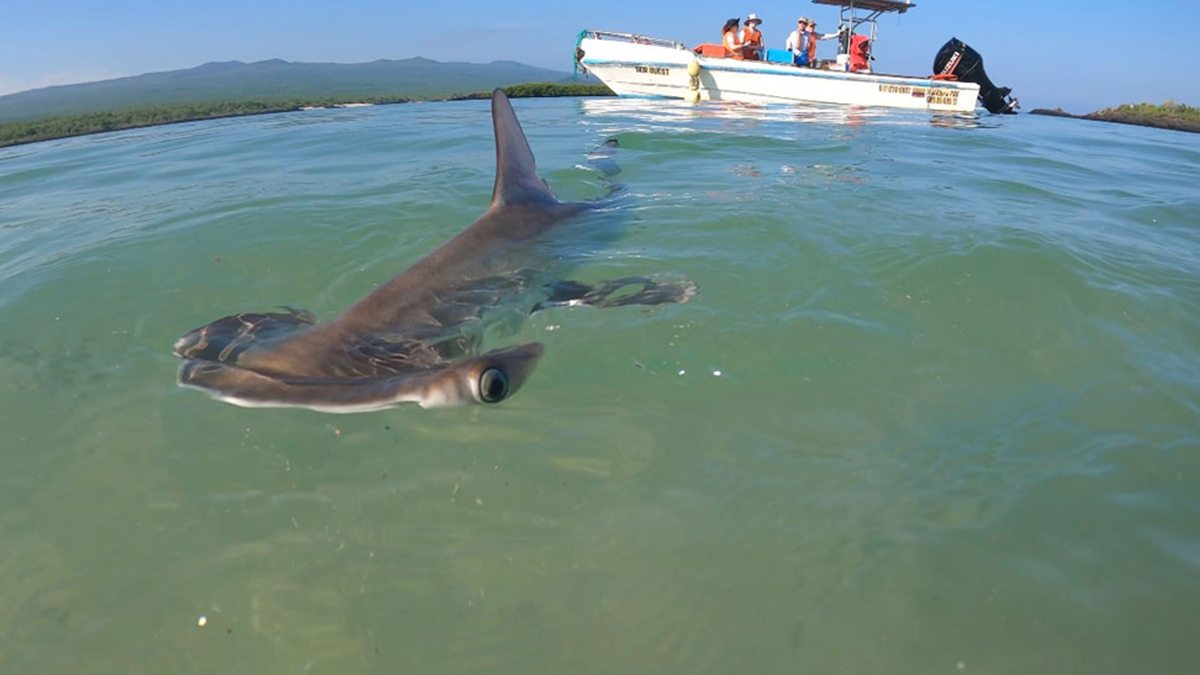Doctoral student protects Galapagos’ sharks
Savannah Ryburn’s humane diet analysis technique conserves critically endangered scalloped hammerheads.

It’s 5 p.m. and the sun is starting to set. But Savannah Ryburn’s workday is just beginning. A doctoral student in the College of Arts and Sciences’ environment, ecology and energy program, Ryburn has dedicated the last five years to researching the diet of juvenile blacktip and scalloped hammerhead sharks in the Galapagos Islands.
For the next 24 hours, she will be on a boat tracking one of the Galapagos’ elusive juvenile scalloped hammerhead sharks, a critically endangered species. She steers the boat to stay close to the shark and record its movements. She’s guided by a hydrophone, an instrument that beeps steadily as it picks up signals from the acoustic tag that she has attached to the shark’s fin. Except for a short nap around 5 a.m., interrupted by a pelican roosting on her head, she will not sleep.
This tracking project, during which she never lost the shark’s trail, is not the first time Ryburn has proven her dedication to her research – or how important her work is.
When she began her research in the Galapagos, juvenile scalloped hammerheads occupied only two known bays. But in the summer of 2022, after two weeks of exploration, Ryburn and staff members of the Galapagos National Park discovered a new juvenile scalloped hammerhead nursery bay on Isabela Island. They dropped lines and immediately caught five scalloped hammerheads, a discovery vital not only for Ryburn’s research but also the collective knowledge about the sharks’ habitats in the Galapagos.
Ryburn is not only thorough but also humane in her research on this endangered species. While the standard method of diet analysis for many animal subjects requires killing and dissecting to see the stomach’s contents, Ryburn uses a cutting-edge technique called metabarcoding to study her sharks’ diets.
Ryburn can complete a workup of each shark in about two minutes, during which she takes basic measurements and swabs the shark’s cloaca for a fecal sample and then releases the shark safely back into the water. After collecting the swab, she completes the metabarcoding part of the analysis herself in the Microbiology & Molecular Biology Lab at the Galapagos Science Center and the Bruno lab at UNC-Chapel Hill. The sequencing core at Carolina completes the actual sequencing.
Using this method, Ryburn has not had a single scalloped hammerhead shark die during their interactions and has been able to figure out everything that her sharks – both the scalloped hammerhead and blacktip – have eaten down to the genus level and almost everything down to the species level.
“Especially when you’re working with a critically endangered species like the scalloped hammerhead, I wouldn’t be able to do any sort of diet study on them if it weren’t for the new method,” Ryburn said.
Ryburn looks forward to her data informing practical conservation measures for these shark species, such as reasonable restrictions to protect the fish in the sharks’ diet. Fishing restrictions are difficult to uphold across the islands, where locals depend on fishing for their livelihoods. But by targeting just the species of fish that Ryburn’s two shark species eat, determined through her metabarcoding, the Galapagos National Park can create rules designed to limit fishing of those specific species and allow both the fisherfolk and sharks to thrive.
“It’s extremely rewarding,” Ryburn said of her research. “I get to work with a critically endangered species that most of the world probably never ever gets to see in their entire life. And I have the opportunity to help conserve them.”







